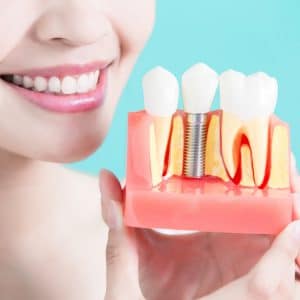
Why Implants Are the Most Durable Option
Are you tired of being limited to certain foods due to your missing teeth or ill-fitting dentures? Our staff at Mesilla Valley Family Dentistry can lift those restrictions, allowing you to consume whatever food or beverages you please. The Dental Implant Advantage If you’re looking to restore your smile and its functions, we can offer you dental implants. These tooth replacements are supported by titanium fixtures to ensure they’re as durable as possible. The implants infuse with your jawbone in a short period of time, causing new bone tissue to grow and strengthen it. This process also creates stability for your beautiful porcelain crowns that are attached to the titanium fixtures. With implants, you’ll be able to chew and speak […]
Continue Reading...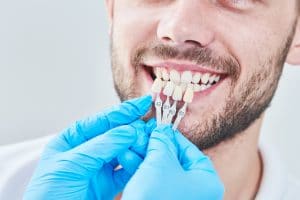
Pros and cons of veneers
If you feel dissatisfied with some aspect of your smile, you may be considering dental veneers as a cosmetic treatment. A veneer is an extremely thin piece of ceramic that adheres to the front surface of one of your front teeth to cover a minor cosmetic problem. Some of the most common ones include teeth staining, a crack or chip in a tooth, or a misshapen tooth. A veneer is also an ideal treatment option when the gap between your two front teeth is larger than normal. At Mesilla Valley Family Dentistry, we understand that you have many factors to consider when it comes to getting a veneer or another type of cosmetic dentistry procedure. We discuss some of the […]
Continue Reading...
Why Your Kids Should Use Sports Mouth Guards
Many kids keep busy during the summer months off from school by playing on organized sports leagues. As a parent, you want to do everything you can to encourage physical activity and sportsmanship while keeping your child safe at the same time. It’s important to protect his or her teeth and jaws as well as other parts of the body. We encourage you to speak to your regular dentist at Mesilla Valley Family Dentistry to learn more about our customized mouth guards. The American Dental Association on the Importance of Mouth Guards An injury to the mouth can knock out teeth, push your child’s upper and lower rows of teeth out of alignment, and cause several other significant injuries. The […]
Continue Reading...
Beverages That Help Your Teeth
While the foods we eat affect the health of our teeth and gums, the same is true of the beverages we drink. Unfortunately, people sometimes overlook this fact when trying to find the cause of their oral health issues. Because drinks have even more contact with teeth than food does, it’s important to look at the ingredients in the things you drink most often. Many soft drinks, for example, have high sugar and acid content that can cause issues such as tooth decay, a weakening of tooth enamel, and sensitivity. If you’re looking for ways to improve your oral health by what you drink, we offer some suggestions for healthy beverages as well as what to limit or avoid. You […]
Continue Reading...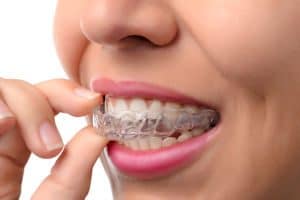
Advantages of Clear Braces
Did you need braces as a child, but your family couldn’t afford them or you didn’t receive them for another reason? If so, it’s not too late for you to straighten your teeth and have the smile you have always wanted. Perhaps you’re the parent of a patient who needs braces but doesn’t want the metal smile associated with them for two or more years. Whatever your situation, Dr. Borham and Dr. Oushy are happy to let you know about Invisalign clear braces at Mesilla Valley Family Dentistry in Las Cruces, New Mexico. The Benefit of Braces without the Metal Invisalign is a revolutionary approach to orthodontic care. Instead of an orthodontist applying wires and brackets to your teeth, you […]
Continue Reading...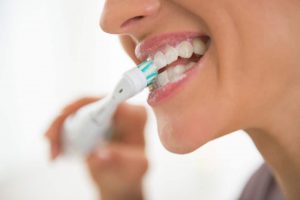
Electric Brush vs. Manual Brushes
Preventative dentistry is about more than just visiting your dentist twice yearly for an exam and thorough cleaning. In fact, the majority of your preventative care is done at-home as a part of your normal hygienic routine. Many residents use manual toothbrushes to remove debris and plaque from their teeth. However, electric brushes have become widely popular in recent years, leaving some to wonder whether one type is better than the other. Did you know… the American Dental Association does not lean toward one type of brush over the other? It does, however, acknowledge that people with upper body mobility restrictions may better benefit from an electric toothbrush instead of a manual brush. Regardless of which type you decide is […]
Continue Reading...
How to Brush Your Teeth
Brushing your teeth is probably a standard part of your daily routine, but chances are you aren’t following the American Dental Association’s guidelines for cleaning your teeth properly. The ADA currently recommends that you brush your teeth at minimum of two times each day – preferably morning and night or anytime you eat foods that contain sugar. When you brush, your toothbrush should be tilted at a 45 degree angle to your gum line. As you brush, be sure to remove debris from every surface of the teeth – including the backs of the teeth, near the gum line, and on chewing surfaces. It is also important to brush your tongue, as bacteria can accumulate there and cause malodorous breath. […]
Continue Reading...
Bad Breath
Having bad breath can be an embarrassing problem – especially if you are regularly face to face with other people. Known professionally as halitosis, bad breath plagues many people every day. Most cases of bad breath can be remedied by efficiently brushing the teeth. However, some types of bad breath are chronic or recurring, which may warrant a visit to the dentist. Did you know… that bad breath can be caused by something as simple as eating too much garlic, or that it could be a serious symptom of a disease? Some of the most common causes of bad breath include dry mouth, certain medications, use of tobacco, poor dental hygiene, and oral infections. In rare cases, bad breath may […]
Continue Reading...
Dental Health and Your Diet
Your body works hard to convert the foods you eat into energy. You may not think twice about what you are eating – especially when it comes to grabbing an afternoon snack or sipping on a vanilla latte on your commute. But the food you put in your mouth affects more than just your waistline. The truth is, your diet has a direct effect on your overall dental health. Developing good eating habits can lead to excellent oral health free of decay and gum disease. The American Dental Association recommends avoiding certain foods that can expedite decay, such as foods high in sugar. Did you know… that eating a slice of pie in the afternoon could be more dangerous to […]
Continue Reading...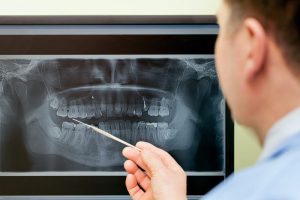
Digital X-Rays
Digital x-rays are a more streamlined way of taking dental radiographs. Like traditional x-rays, digital versions provide an in-depth view of the structures of the mouth, helping dentists detect complications and develop effective modes of treatment. Digital x-rays are capable of revealing hidden caries, bone erosion, and even tooth decay hiding beneath restorations. Requiring less radiation and no film to process, digital x-rays have become the standard for oral imaging. These systems produce instant digital images that can easily be enhanced and enlarged for a more accurate diagnosis. The images are captured, stored, and even transmitted via in-office computers. In fact, dentists can easily print or email copies of x-rays in just seconds. Dental x-rays make for a better and […]
Continue Reading...